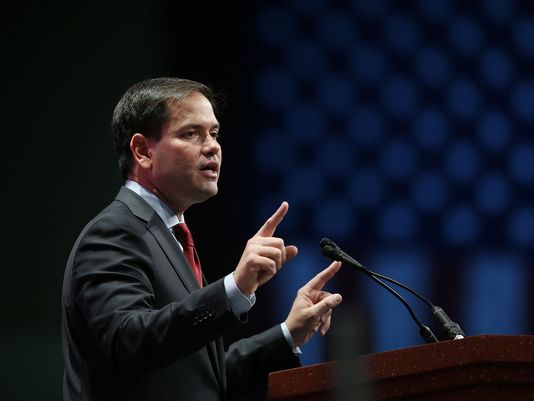Rubio’s Lack of Dominance Could Hurt
Rubio’s Lack of Dominance Could Hurt

Florida Sen. Marco Rubio speaks at the Heritage Action Presidential Candidate Forum September 18, 2015 in Greenville, South Carolina. (Photo credit: Sean Rayford / Getty Images via St. Cloud Times)
By Joe Trenzeluk
St. Cloud Times (p. 10A, 12A)
February 14, 2016
A common criticism of Florida Sen. Marco Rubio, a contender in this year’s chaotic presidential election, is that his youthful vigor and optimistic charisma are eerily reminiscent of Barack Obama [link added]. However, over the past few weeks even more critical verbal bombs have been thrown his way.
New Jersey Gov. Chris Christie – whose quest for the Republican nomination was torpedoed by a sixth-place finish in Tuesday’s New Hampshire primary on which he had pinned his hopes – asserted Rubio was “the boy in the bubble,” implying the young senator is a scripted, controlled candidate [link added] who lets his campaign handlers tell him what to say and when and how to say it.
For Rubio, the notion that he’s a robotic, empty-suit politician trapped in a “bubble” of cautious complacency is even more damaging than being called “the Republican Obama” [link added].
So, how accurate is Christie’s accusation?
Empirical analysis of Rubio’s personality, conducted at the College of St. Benedict and St. John’s University’s Unit for the Study of Personality in Politics, sheds some light on the nature of the supposed “bubble boy” from the Sunshine State.
Personality drives politics
Personality refers to the stable patterns of a person’s motives, thoughts and actions over time and across situations. Accurate personality assessment allows us to anticipate a leader’s response to a broad range of contingencies – including those not currently on the political radar.
The best predictor of future behavior is past behavior, and empirically examining Rubio’s typical behaviors patterns yields key insights into his political persona and presidential prospects.
Rubio’s scale elevations on the Millon Inventory of Diagnostic Criteria assessment tool confirm what many already know: Rubio, like many politicians, is primarily ambitious and outgoing.
Ambitious charmer
People with an ambitious personality pattern – that is, healthy narcissism – are characteristically self-confident, achievement oriented and competitive. They are charming and skilled at winning others over to their causes, fully expect others to recognize their special qualities and cater to them, are occasionally short on social reciprocity, and may at times display a sense of entitlement.
People with an outgoing personality pattern are characteristically sociable, with a warm, likable personal style. Though image-conscious and needing validation, they are confident about their social skills and their ability to influence and charm others.
On the downside, they tend to be easily bored with routine activities and may be viewed as inconsistent or undependable. Rubio’s outgoing personality is particularly evident in his socially adept, emotion-tinged oratorical skills.
Cautious people pleaser
Rubio’s primarily ambitions and outgoing personality pattern is moderated by an infusion of secondary traits associated with conscientiousness and agreeableness.
Regarding the former, Rubio is inclined to be cautious, prudent, and risk averse – traits commonly expressed in attention to detail, working scrupulously to study the information and learn the skills necessary for success in their occupation, and being rehearsed and programmed at the expense of cognitive flexibility and the virtuosity to improvise on the fly.
Regarding the latter personality factor – agreeableness – Rubio, ironically enough, appears to be similar to Obama in that he is more accommodating than dominant. As a plus, accommodating personalities can reconcile differences and concede when necessary; cordiality and compromise characterize their interpersonal relationships and they are warm, congenial, and gracious, even to those they dislike.
The downside is that agreeableness may be perceived as lack of strong leadership.
Rubio vs. his rivals
The composite portrait painted by the sum total of these personality components portrays Rubio in sharp relief: Relative to his prime rivals for the Republican nomination, he is more compassionate and compromising than firebrand Texas Sen. Ted Cruz; more measured and less flamboyant than the pugnacious, self-promoting Donald Trump; and more outgoing and charismatic than his former mentor, Florida Gov. Jeb Bush.
All things considered, Rubio has a personality profile that makes him likable and allows him to connect with voters on a personal level. But his Achilles’ heel beyond being too programmed is his deficit of dominance, which could hamstring his best efforts to pop his “bubble” and navigate the treacherous waters of presidential campaigning.
This is the opinion of Joe Trenzeluk, Inver Grove Heights, a senior psychology major at the College of St. Benedict and St. John’s University, where he was a summer research fellow in the Unit for the Study of Personality in Politics, directed by Aubrey Immelman.

Joe Trenzeluk, Inver Grove Heights (Submitted photo)
About this series
This is the eighth in an occasional series of personality profiles of most of the Republican candidates in the 2016 presidential election. For the past two summers, Joe Trenzeluk has been a research assistant at the Unit for the Study of Personality in Politics, a collaborative faculty–student research program in the psychology of politics at St. John’s University and the College of St. Benedict, led by associate professor Aubrey Immelman, who specializes in the psychological assessment of presidential candidates and world leaders.
The unit’s summer research program focused on GOP contenders because of the unprecedented number of presidential hopefuls and the unit’s mission to help the public make better informed voting choices. Studies of Democratic candidates are in progress.










Follow Aubrey Immelman